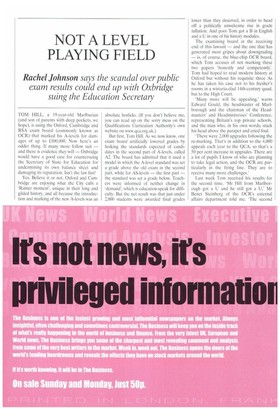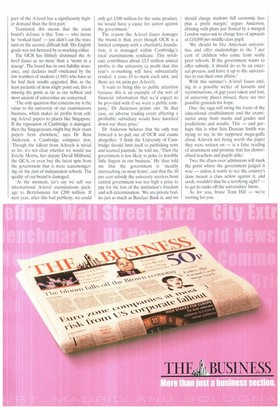NOT A LEVEL PLAYING FIELD
Rachel Johnson says the scandal over public exam results could end up with Oxbridge suing the Education Secretary
TOM HILL, a 19-year-old Marlburian (and son of parents with deep pockets, we hope), is suing the Oxford, Cambridge and RSA exam board (commonly known as OCR) that marked his A-levels for damages of up to £100,000, Now here's an odder thing. If many more follow suit — and there is evidence they will — Oxbridge would have a good case for countersuing the Secretary of State for Education for undermining its own balance sheet and damaging its reputation. Isn't the law fun!
Yes. Believe it or not, Oxford and Cambridge are enjoying what the City calls a 'Ratner moment', unique in their long and gilded history, and all because the introduction and marking of the new A-levels was an absolute horlicks. (If you don't believe me, you can read up on the sorry mess on the Oualifications Curriculum Authority's own website on www.qca.org.uk.) But first, Tom Hill. As we now know, one exam board artificially lowered grades by hoiking the standards expected of candidates in the second part of A-levels, called A2. The board has admitted that it used a model in which the A-level standard was set a grade above the old exam in the second part, while for AS-levels — the first part — the standard was set a grade below. Teachers were informed of neither change in 'demand', which is education-speak for difficulty. But the net result was that just under 2,000 students were awarded final grades lower than they deserved, in order to head off a politically unwelcome rise in grade inflation. And poor Tom got a B in English and a U in one of his history modules.
The examining board at the receiving end of this lawsuit — and the one that has generated most gripes about downgrading — is, of course, the blue-chip OCR board, which Tom accuses of not marking these two papers 'honestly and competently'. Tom had hoped to read modern history at Oxford but without his requisite three As he has taken his case not to his fresher's rooms in a wistaria-clad 14th-century quad, but to the High Court.
'Many more will be appealing,' warns Edward Gould, the headmaster of Marlborough and the chairman of the Headmasters' and Headmistresses' Conference. representing Britain's top private schools, and the man who, in his own words, stuck his head above the parapet and cried foul.
'There were 2,000 upgrades following the re-marking. That's in addition to the 4,000 appeals each year to the OCA, so that's a 50 per cent increase in upgrades. There are a lot of pupils I know of who are planning to take legal action, and the OCR are particularly in the firing line. They are to receive many more challenges.'
Last week Tom received his results for the second time. 'Mr Hill from Marlborough got a U and he still got a U,' Mr Benet Steinberg of the OCR's external affairs department told me. 'The second part of the A-level has a significantly higher demand than the first part.'
Translated, this means that the exam board's defence is that Torn — who insists he 'worked hard' — just didn't cut the mustard on the second, difficult half. His English grade was not bettered by re-marking either.
The OCR has blithely dismissed the Alevel fiasco as no more than a 'storm in a teacup'. The board has its own liability insurance, and declares itself vindicated by the low numbers of students (1,945) who have so far had their results upgraded. But, as the least pedantic of dons might point Out, this is missing the point as far as our noblest and most ancient of universities are concerned.
'The only question that concerns me is the value to the university of our examinations business, which makes its profits from selling A-level papers to places like Singapore. If the reputation of Cambridge is damaged, then the Singaporeans might buy their exam papers from elsewhere,' says Dr Ross Anderson, a Cambridge computer don. 'Though the fallout from A-levels is trivial so far. it's not clear whether we would sue Estelle Morris, her deputy David Miliband, the QCA, or even buy the latest spin from the government that is mere scaremongering on the part of independent schools. The quality of our brand is damaged.
'At the moment, let's say we sell our international A-level examinations package to Bertelsmann for £200 million. If next year, after this had publicity, we could only get £100 million for the same product, we would have a cause for action against the government.'
The reason the A-level fiasco damages the brand is that, even though OCR is a limited company with a charitable foundation, it is managed within Cambridge's local examinations syndicate. This syndicate contributes about £3.5 million annual profits to the university (a profit that this year's re-marking will have substantially eroded: it costs £9 to mark each unit, and there are six units per A-level).
'I want to bring this to public attention because this is an example of the sort of financial information that we'd expect to be provided with if we were a public company,' Dr Anderson points out. 'In that case, an adverse trading event affecting a profitable subsidiary would have knocked down our share price.'
Dr Anderson believes that the only way forward is to pull out of OCR and exams altogether. 'I think the University of Cambridge should limit itself to publishing texts and learned journals,' he told me. 'Then the government is less likely to poke its horrible little fingers in our business.' He then told me that the government is 'steadily encroaching on most fronts', and that the 40 per cent subsidy the university receives from central government was too high a price to pay for the loss of the institution's freedom and self-determination. 'We are private bodies just as much as Barclays Bank is, and we should charge students full economic fees plus a profit margin,' argues Anderson, chiming with plans just floated by a merged London super-uni to charge fees of upwards of £10,000 per middle-class pupil.
'We should be like American universities, and offer studentships to the 7 per cent of children who come from really poor schools. If the government wants to offer subsidy, it should do so by an external process, and leave it up to the universities to run their own affairs.'
With this summer's A-level fiasco ending in a possible welter of lawsuits and recriminations, of gap years taken and lost, of university places missed, there are two possible grounds for hope.
One: the saga will swing the focus of the educational establishment and the examinariat away from marks and grades and predictions and results. This — and perhaps this is what lain Duncan Smith was trying to say in his supposed mega-gaffe about A-levels not being worth the paper they were written on — is a false reading of attainment and promise that has demoralised teachers and pupils alike.
Two: the chaos over admissions will mark the point where the government judged it wise — unless it wants to see the country's dons mount a class action against it, and 000h, wouldn't that be a terrifying sight? — to get its tanks off the universities' lawns.
As for you, brave Tom Hill — we're rooting for you.



















































































 Previous page
Previous page